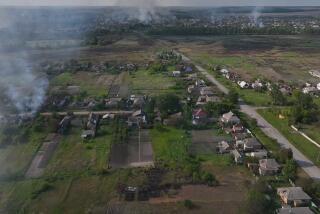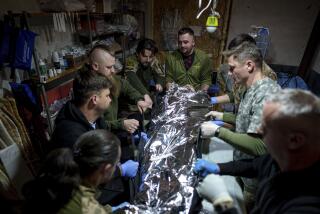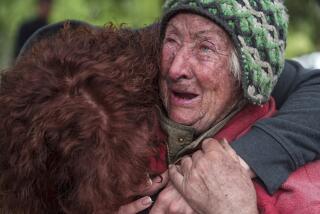Chechen Support for Guerrillas Begins to Wane
- Share via
DUBA-YURT, Russia — As Russian fighter jets swooped over his village in Chechnya, 69-year-old Magomed Elbuzdukayev shook a fist in anger--not at the bombers but at the young man running with a rifle toward the neighborhood under fire.
“What can you do against those planes?” the elder man cried out. “You just give them a pretext to bomb us. You pass through here one day and leave the next, but we who live here will keep suffering.”
The guerrilla did not break stride. Had he glanced back, he would have seen a small crowd of villagers gazing at the blue sky and murmuring about the order of the day in these foothills of the Caucasus Mountains--that is, how to stay out of a separatist war they believe is all but lost.
Nearly six months after taking up arms against the Russian invasion of their tiny breakaway republic, many Chechens are losing the will to resist. Russian troops have conquered Grozny, the rebel capital, and the rest of the plains with instructive brutality, prompting civilians in the highlands into desperate negotiations to keep their villages neutral.
Their agreements with the Russian and Chechen armies are fragile and often broken. But grass-roots truce efforts reflect waning support for the separatists that is costing them sanctuary and new recruits for their last stand in the mountains.
The Chechen rebels apparently suffered a major setback when the Russians destroyed their mountain headquarters of Vedeno with an air attack Wednesday and then occupied the town with troops and tanks late Saturday.
Russian television showed Col. Gen. Anatoly S. Kulikov, the Russian commander, descending from a helicopter Sunday in Vedeno and addressing townspeople. The Interfax news agency said a Chechen spokesman denied the loss of the town, 38 miles southeast of Grozny, but television showed no sign of ongoing resistance.
“Everybody had this idea in the beginning that we could win if we didn’t let Russia scare us,” Gilani Eldarov, a 59-year-old truck driver, said as he watched the midday air raid in Duba-Yurt, which severely injured a woman in her garden. “But then they started using their air force, their bombs, their Grad missiles. . . .
“Now I tell our fighters to shave their beards and go back to work before the Russians finish us off. This war is becoming senseless. It is time to save the Chechens as a people.”
That sentiment was echoed by younger, fighting-age men in the crowd, which had gathered outside Duba-Yurt’s red brick mosque before Friday prayers, and by people in other highland villages. Gone was the fervor of last winter, when a Russian attack on any village would swell the ranks of President Dzhokar M. Dudayev’s separatist army, with the blessing of elders and Muslim prayer leaders.
Chechens often tell their history as one of continuous resistance to Russian rule. With a few thousand fighters and a wooded, mountainous terrain suited for guerrilla war, Dudayev’s commanders say they can duplicate the feat of the Imam Shamil, who held off Moscow’s superior army in the Caucasus for four decades in the last century. And indeed they might.
But their effort to draw mountain villagers into this beleaguered venture is faltering.
“Why are there no more volunteers?” Aslan Maskhadov, the top Chechen commander, asked in a radio broadcast last month--a rare admission from the separatist leadership that rebel ranks are dwindling.
Chechen history is also one of accommodation with Moscow, and the villages are falling into line. Under pressure from local leaders, Maskhadov recently ordered his fighters to withdraw beyond a radius of five-eighths of a mile around each village and to stay out unless they have some limited mission. The order is frequently violated.
To patrol these buffer zones and enforce their neutrality, many villages have organized militias made up, in part, of dropouts from the separatist army.
“We are resisting the Russians the best way we know--asking our fighters to keep away,” said Said-Selim Anasov, 35, a member of one local militia.
Since invading Chechnya in December to end Dudayev’s self-declared independence, Russian forces have sought to avoid face-to-face combat. Most of the estimated 20,000 dead were civilians punished by Russian bombing or distant artillery guns for having separatist fighters in their midst.
As the Russians advanced south and east from the ruins of Grozny, fearful townspeople persuaded Chechen fighters to withdraw from Gudermes, Argun, Shali and other large settlements on the plains and to head for the greening hills and mountain gorges that make up one-fifth of the republic’s territory.
The Russian-installed Chechen government in Grozny lobbied quietly for the capitulation of these towns. Senior citizens are universally respected in the tradition-bound Caucasus, so “we used the time-tested method of turning the elders into vehicles of communication,” said Salambek Khajiyev, Chechnya’s provisional prime minister.
The message to the fighters: Go away.
Elias Akhmadov, a 34-year-old general staff officer in Dudayev’s army, said fear is swaying many elders to oppose the separatist cause.
“The elders are the weak point of our society,” he said, noting that virtually all Chechens over the age of 50 experienced the trauma of being deported by Soviet dictator Josef Stalin from their Caucasus homeland to Central Asia--an exile that lasted 13 years.
“They’ve been afraid since 1944. It is hard for them to understand the bravery of the young,” Akhmadov said.
Where townspeople were unable to neutralize resistance in the lowlands, the Russian forces were brutal. Interior Ministry troops entered the separatist town of Samashki on April 8, spraying doorways with machine-gun fire and tossing hand grenades into basements. More than 150 civilians reportedly died, according to survivors and international relief agencies.
In the highlands, the word Samashki now inspires fear and has two interpretations. Uttered by the Russians, who claim they met armed resistance there, Samashki is a powerful threat against any village harboring separatists; uttered by the separatists, who claim their forces had withdrawn before the massacre, it represents a lesson in what can happen to a village that rejects them as protectors.
Most villages have opted for seemingly endless discussions aimed at keeping both forces at bay. In a pattern repeated across the highlands, local leaders gather in barracks, mosques or public squares for separate talks with each army; the Russians, usually camped outside town, agree to stop long-range fire after all Chechen fighters have left and a local militia is in place.
That is not so simple in practice. The experiences of Stariye Atagi and Chiri-Yurt, less than three miles apart in the foothills, show how difficult and messy neutrality can be. Yet, to the chagrin of separatists, it is a goal villagers refuse to abandon.
After losing Grozny, the separatists set up a base in Stariye Atagi, drawing Russian fire from outside the village. A third of the homes were destroyed and 45 civilians were killed as shelling reduced the population from 17,000 to fewer than 100.
“The village was divided,” recalled Vakhid Ismailov, a retired police major who became its unofficial security chief. “Some elders understood that Dudayev’s forces had brought more harm than good. Others said we should join the fight for independence. Emotions triumphed over common sense until the bombing started in earnest.”
Ismailov sent a mission with a white flag to talk to the Russian army. Separatists opened fire to try to stop it, wounding one villager. An agreement allowing villagers to feed cattle isolated near the Russian base ended when a new commander’s troops shot at a teen-ager delivering fodder on a tractor.
It took Ismailov 10 meetings with the guerrillas and 15 with the army to achieve a cease-fire. The separatists were led by Zelimkhan A. Yanderbiyev, Dudayev’s vice president, who is from Stariye Atagi and kept insisting that the village and the fighters needed each other to survive.
“We don’t want your protection,” a villager shouted at one meeting. “You haven’t destroyed a single tank, and look at our homes.”
The fighters finally left in April after neighbors threatened a vendetta against Yanderbiyev and his family in the event of any further harm by the Russians. A dozen guerrillas stayed to help form a local militia, and the Russian shelling stopped.
Although the Russian army is still at the village outskirts and sporadic gunfire killed at least five inhabitants last month, most people are returning, and Stariye Atagi is, by Chechen standards, a model of stability.
On a recent afternoon, as shoppers crowded Stariye Atagi’s outdoor market, Russian missiles rained from the west and the north on neighboring Chiri-Yurt, sending many of its 6,300 inhabitants into bomb shelters.
The target was a cement factory at the edge of town held by separatists. Village leaders met in April and agonized over how to get them out.
“It was hard,” said Salambek Altemirov, Chiri-Yurt’s 37-year-old mayor. “It runs against our tradition of hospitality to ask a guest to leave, especially when they think they are protecting you. Finally, they understood they were not welcome and left on their own.”
The mayor then got two Russian army regiments outside town to stop shelling. Workers entered the cement plant to restart production. But on the third day, the army advanced toward the village, violating the local cease-fire and prompting a different separatist band to seize the factory. The Russian shelling resumed, destroying at least 10 nearby homes and killing at least 15 civilians before the separatists were driven from the plant.
Altemirov, a tall, thin former schoolteacher with a drooping black mustache and the dazed look of a man who has not slept well in months, told this story without emotion on one of the worst days of the shelling, explosions rattling his City Hall windows every few minutes.
“The Chechen fighters won’t even talk to us now, but we must do something to save our village,” he said. “Nothing good can come from the Russians, but we cannot afford to resist them.
“We are sober-minded people who realize that Chechnya can be independent only when Russia is a civilized democratic country. Russia is still an imperial power, and we have to live with it.”
More to Read
Sign up for Essential California
The most important California stories and recommendations in your inbox every morning.
You may occasionally receive promotional content from the Los Angeles Times.













